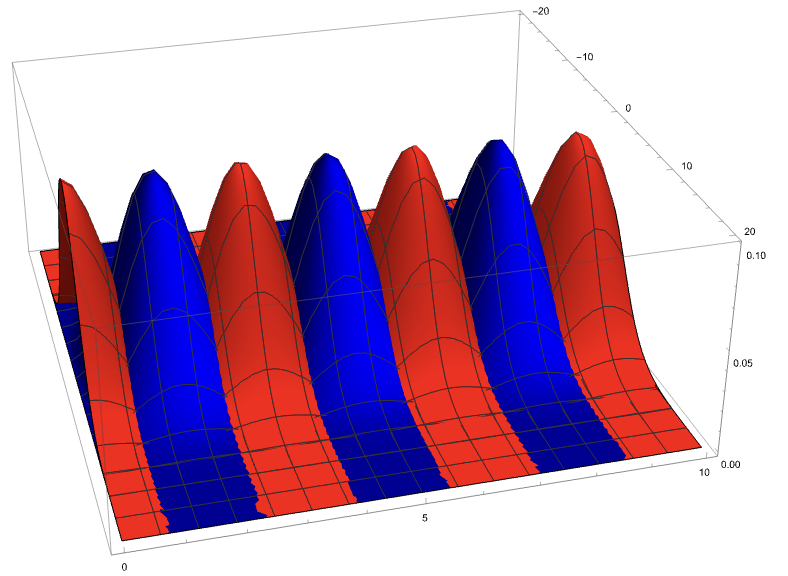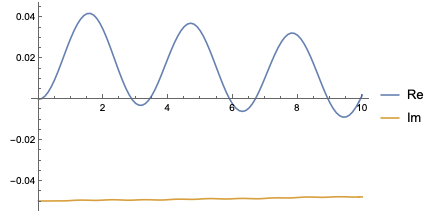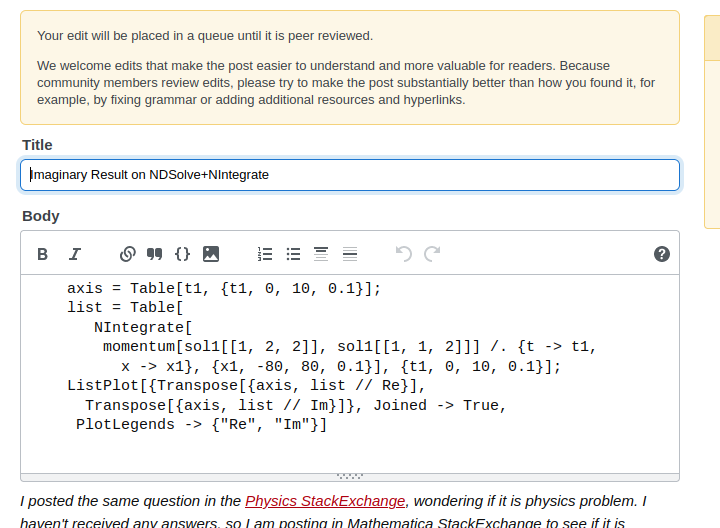I posted the same question in the Physics StackExchange, wondering if it is physics problem. I haven't received any answers, so I am posting in Mathematica StackExchange to see if it is programming issue. Please let me know if it is against any policy.
I am trying to solve the Schrödinger equation in position space.
$$i\hbar\frac{i\hbar\partial\Psi\left(x,t\right)}{\partial{t}}=-\frac{\hbar^2}{2m}\nabla^2\Psi\left(x,t\right)+V\left(x,t\right)\Psi\left(x,t\right)$$
Let's assume it is 1D in wave function with two level system atom, $\Psi(x,t)=C_g(x,t)|{g}\rangle+C_e(x,t)\exp[I(kx-wt)]|{e}\rangle$.
$V\left(x,t\right)$ is atom-light interacting potential, it is $\vec{d}\cdot\vec{E}$ potential.
Solving two equations gives:
$$i\hbar\frac{\partial C_g\left(x,t\right)}{\partial{t}}=-\frac{\hbar^2}{2m}\frac{\partial^2 C_g\left(x,t\right)}{\partial{x}^2}+\Omega \exp[-i(kx)] C_e\left(x,t\right)$$ $$i\hbar\frac{\partial C_e\left(x,t\right)}{\partial{t}}=-\frac{\hbar^2}{2m}(\frac{\partial^2 C_e\left(x,t\right)}{\partial{x}^2}+2 i k \frac{\partial C_e\left(x,t\right)}{\partial{x}})+\Omega^* \exp[i(kx)] C_g\left(x,t\right)$$
where $ \langle e| \vec{d}\cdot \vec{E} |g\rangle=\Omega \exp[- i w t]$.
I wish to solve this analytically, but it seems very difficult due to the term $\exp[i(kx)]$, so if I solve them numerically, by giving initial condition of $ C_g(x,0)=\sqrt[4]{\frac{2}{\pi }} \sqrt{\frac{1}{\text{$\sigma $x}}} \exp \left(-\frac{x^2}{\text{$\sigma $x}^2}\right),C_e(x,0)=0$, and setting constants $\hbar,\Omega,m$ to 1, $k=0.1$, and $\sigma x=8$, we got:
where the red is ground state and blue is excited state. The problem is that when I try to see the expectation value of the momentum, I am getting imaginary number. It might be either computational problem/incorrect boundary condition/some mistake of calculation.
Momentum is calculated with simple method: $\Psi^*(x,t) \frac{\hbar}{I} \frac{\partial}{\partial x} \Psi(x,t)$, then we got:
It shows the imaginary and real part of the momentum is much below what I am expecting momentum ($k=0.1$). However, momentum cannot be imaginary, so there must be a problem. Anyone has any clue what is the problem? Thanks!
Here is Mathematica code:
sx = 8.;
k := 0.1;
sol1 = NDSolve[{
I D[a[x, t], t] == -1/2 D[a[x, t], {x, 2}] + Exp[-I k x] b[x, t],
I D[b[x, t],
t] == -1/2 (D[b[x, t], {x, 2}] + 2. k I D[b[x, t], x]) +
Exp[I k x] a[x, t],
a[x, 0] == (2./Pi)^(1/4) Sqrt[1/sx] Exp[-x^2/(sx^2)],
b[x, 0] == 0.}
, {a[x, t], b[x, t]},
{x, -80., 80.}, {t, 0, 10.}, MaxStepSize -> 0.1]
Plot3D[{Evaluate[Abs[a[x, t] /. sol1]^2],
Evaluate[Abs[b[x, t] /. sol1]^2]}, {x, -20, 20}, {t, 0, 10},
PlotRange -> All, PlotPoints -> 50, PlotStyle -> {Red, Blue}]
momentum[cg_, ce_] := -I (Conjugate[cg] D[cg, x] + Conjugate[ce] D[ce, x])
axis = Table[t1, {t1, 0, 10, 0.1}];
list = Table[
NIntegrate[
momentum[sol1[[1, 2, 2]], sol1[[1, 1, 2]]] /. {t -> t1,
x -> x1}, {x1, -80, 80, 0.1}], {t1, 0, 10, 0.1}];
ListPlot[{Transpose[{axis, list // Re}],
Transpose[{axis, list // Im}]}, Joined -> True,
PlotLegends -> {"Re", "Im"}]



